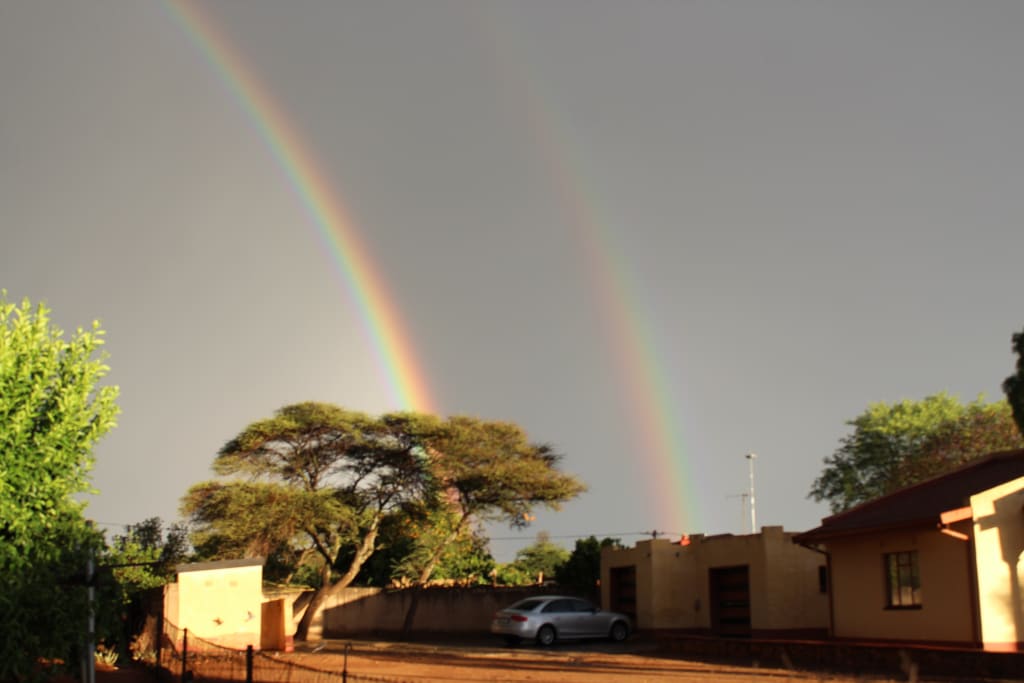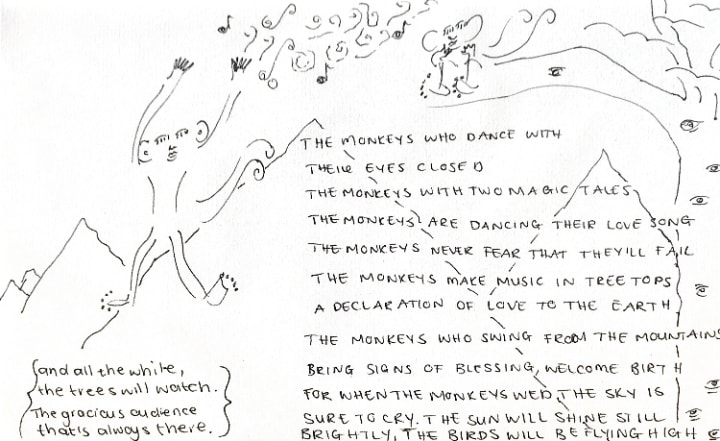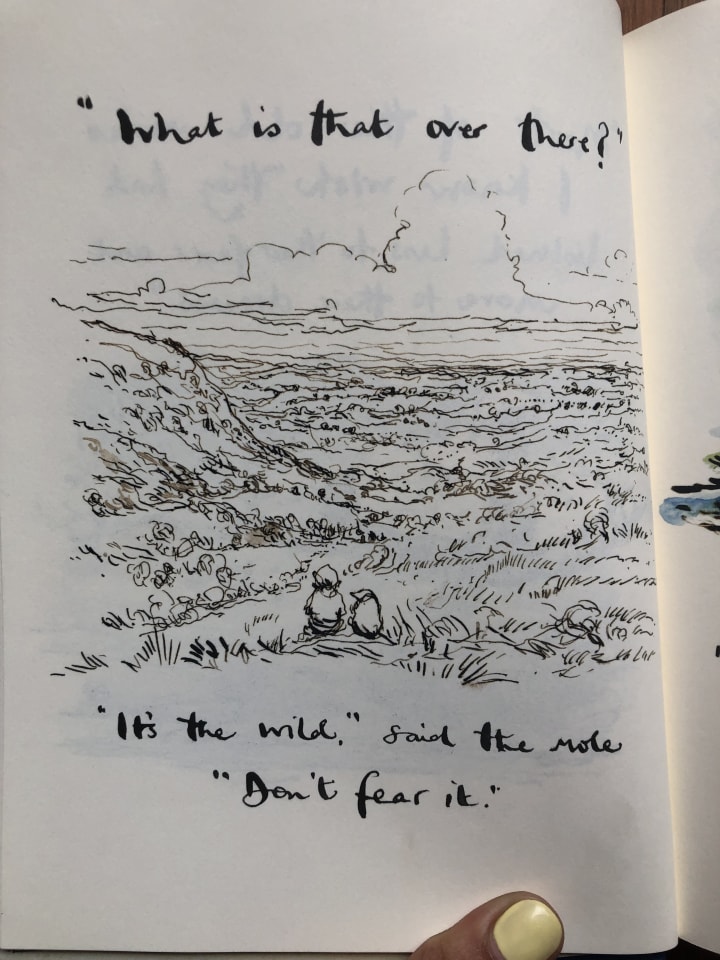The Monkeys' Wedding
A South African tale of one of the most dangerous mountains in the foothills of Mozambique and Zimbabwe, and why we call it a "Monkey's Wedding" when the sun still shines as it rains.

"You have a story that deserves to be told,
But you will have to be strong, be courageous, be bold.
Trust your knowing and let your life unfold,
For though your body is young, your soul is so old.
Share the story of who you come from;
How some were settlers, others were sold
Because now it is your chance to turn dust into gold.
And though the path has been rocky,
Know that you are never alone,
For there are others like you, too, who spread love where they go.
And though, yes, the journey will now require you to be braver, worry not now, nor never,
For the wheel now turns in your favour!”
Takunda paged through her poetry journal, where the poem she must have read a hundred times now, actually began to painfully make sense in her life. She had read and re-read the poem she wrote nine months earlier many times since the conversation with her mother three weeks ago, when she asked for her permission to journey to Mt. Nyanga of Zimbabwe/Mozambique. Immediately, her mother cut the conversation off, refusing to indulge this 'childish fantasy', explaining quickly but not openly, that the myth of Mt. Nyanga was true: people disappear there. That for generations, people have only gone there to die. That in fact, this great-great grandmother she so incessantly and defiantly kept asking about, died there many years ago too and that it changed her family's history forever, leaving them with no money at all and generations of a 'curse' that followed. And anyway, that they had no money to afford her travels.
Takunda had heard different versions of the mountain's myth; that the mountain was sacred and you could strengthen your spiritual gifts there while watching monkeys who kept their eyes closed and had two tails dance wildly at their own weddings. However, if you made any remarks about this upon your return home, the ghosts would come and take you away and curse your family's name. Another tale told of trees with sap that made people with different skin colours, fall madly in love. The tale goes that the trees would speak to the humans and pretend to bless their cross-cultural romances, inviting them to hug the tree, only to trick them so they could open a door in their trunks that swallowed the bodies whole so no one could watch this disgrace. She knew better than to believe these stories that her family had been telling her for too long. She was different; had a broader perspective and a wide imagination that made her restless in her small home in Johannesburg. Because she read so much, she also understood that her family and people around her had been conditioned, perhaps by government or religion, to believe in these fearful stories.
Her favourite version of the story was the one she saw in a dream and pieced together from a poem she had found in an old suitcase where she shouldn't have been looking. Broken and ripped up, it was a letter from he great-great grandmother who had supposedly never returned home after her trip to Mt. Nyanga. Takunda, like Santiago of The Alchemist, was a follower of the signs. The faded and barely legible words read:
"The Monkeys who dance with their eyes closed,
The Monkeys with two magic tales
The monkeys are dancing their love song
The monkeys never fear that they'll fail."

There were more words to the poem, but Takunda could not read them. Curious as she was nine months earlier when she found the paper, she promised herself she would go and watch the monkeys and finish the rest of the poem. She had read enough to know that if she did not fear failure, something that stopped most of her people doing what they would otherwise love to do, she would succeed, and here, she would discover her life's purpose. She had her own theories she was developing about life and people, and knew that she had to follow the language of the words; her primary love language. So, she fingered to page 59 of her favourite children's book, just to make sure her leaving was the right decision, consulting her great-great grandmother through the book. She opened onto the lines:
"I want to know what really happened," I replied.
"Then you shall," she said.

She had felt that the myths of Zimbabwe and Mozambique had too long been etched with skeptic racism and ignorant fear and that these stories were probably created by men who were afraid of people who did not look like them. The version of the story she enjoyed the most was that in the foothills of this mountain range, the water will welcome you and whisper your name, and in that way, you will know your life's purpose. However, the version of the story she practically believed is that people probably stayed there because they fell in love, and that her great-great grandmother who dies of malaria, probably also died because of heartbreak, like the tale in her favourite children's book The Butterfly Lion.
It was unconventional, and her story didn't make sense to others. She had lived with the white part of her family most of her life, but she knew her father had family with origins in that mountain too, and that they looked very different from her mothers. She had heard that they had miraculous psychic abilities, the gifts of mediumship and healing hands, and could turn herbs into the most powerful concoctions that could cure malaria and other diseases. Yet, no one ever spoke about this. So many conversations were forbidden in her family. She was lucky she could pass as 'white' because the Apartheid government would never have even allowed her to cross the border if she dare admit she was somehow black, too. The only giveaway, her name. And her family called her "T".
She knew that the journey would be challenging, but she herself had written many poems that were telling her to go. The most difficult part of the journey she knew, would be the leaving after the telling. Was it better to ask for permission, or forgiveness this time around? She had by now, already done many rebellious things. Dropped her Business classes years earlier, refused the family's business, left the abusive relationships, and called others out who chose not to leave theirs. She sang and danced and lived as only she artistically could, following the advice she had found in the books her mother would lament if she knew she was consulting fantasies as truth. But Takunda knew that the diction in fiction, and the fire in fantasy held the mightiest flames. Going through her bookshelf, she touched her copies of The Prophet, The 8 Habits of Love, and The Secret,. She smelled the pages of The Alchemist and fondly picked up The Butterfly Lion, thanking it. She took her final message from the book The Boy, The Mole. the Fox and the Horse.


And so, she would go. Living and breathing as an artist, Takunda was the only one in her family who had mentioned the name of the mountain three weeks before. She had written about it in a poem, using her strategy of automatic writing, which brings her messages from beyond the physical realm. With the same gift her great-great grandmother had, her writing was a prophetic symbol from 'beyond', a gift which you strengthened at the mountains. She was practical enough that she researched the reasons monkeys have tails, and learned they could have two types of tails: non-prehensile and prehensile. She read in the Washington Post that "like cats’, non-prehensile tails are designed to help an animal with balance as it swings, climbs and jumps through its environment. A prehensile tail, on the other hand, can also grab objects and has the ability to act like an extra arm as well as a tail." She knew that somehow, though she had never laid eyes on these monkeys in real life, her dreams had shown her they existed. She loved to sleep, because dreaming felt more like living than it did in her home where no one really spoke, except at dinner time. She also made a connection between
Quickly second guessing herself, she hesitates - does she pack the books? Will there be space in the bag or will her 'things' weigh her down? She has 17 minutes before her mom comes home. In her dream, she saw monkeys getting married and dancing, swinging from treetops and dancing on the mountains. She had to go, and so, she went leaving a letter behind.
PART 2
"The Monkeys who dance with their eyes closed,
The Monkeys with two magic tales
The monkeys are dancing their love song
The monkeys never fear that they'll fail.
The Monkeys make music in tree tops
A declaration of love to the earth
The Monkeys who swing from the mountains
Bring signs of blessings; welcome birth
For when the monkeys wed
The sky is sure to cry
The sun will still shine brightly,
The birds will be flying high"
Holding the infant in his tails, Bangalore whispers to the water:
"Your name will be Takunda. It means: You have overcome. You will have an inquisitive, restless, seeking nature. You will feel impelled by intense desires that you cannot comprehend but will one day, satisfy. Not everyone will understand you in your youth, but you will overcome any challenge that comes your way and you will be the calm in the chaos (though some will think it was you who created the chaos). You will be love manifested in the physical form and will lead the entire world to forgiveness. You will open your eyes, and when you do, all the others will too. You will be the one to break all the curses and rescue your family's treasure. You will have to be braver at times, yes, but trust that the steepest hills will lead you to the best views. Oh, and you will sing healing songs for the world! Your playful disposition will become a blessing to everyone you meet. And in the words of the Prophet Khalil Gibran, who was once a monkey too, "forget not that the earth delights to feel your bare feet and the winds long to play with your hair." My dear, may your life be nothing short of magical. May you defy all the odds. The wheel now turns in your favour; the water whispers prayers for you."
With a flick of his tails in the water as a gesture of thanks, Bangalore seals the prophecy in the stream. When he returned to the tribe, Bangalore held the infant up and with cheers from the blind monkeys with two magic tails, pronounced the baby monkey's name: "Takunda."
Little Orie, Takunda's older brother who was still only a small boy, sensed something in the water. He opened his eyes, something the two-tail monkeys hardly ever needed to do, and his tails started dancing wildly.
"Open your eyes, gramps. You're going to want to see this."
And before he could open his eyes, Bangalore could sense what his grandson was seeing. "A human", whispered Bangalore, in awe, but not in surprise. "I had a feeling today would be the day," he said in admiration, more to himself than to Little Orie.
"She is truly something special, huh? But gramps, why does she cry so loudly, gramps? Why does she cry at all?" asked Little Orie.
"Gramps, can you tell me again about the humans. I long to see and feel one close to me, but everyone in the tribe says no humans have visited this place for decades, why is that so?"
You see, the humans they think we are too loud. They don't realise we are signing songs to celebrate and thank them! Or when we come to fetch our bananas, they think we are trying to make them angry. They forget the bananas were ours first, and though it is not a competition, they forget that we must share. They fear us because they cannot understand and so they would rather
The humans will live in homes of four walls or more, and they will hang paintings on their wall from people they claim to hate and be better than. They will walk on Egyptian rugs, yet disrespect their people. They will feed their babies from the breast of black women, yet they will not pay the black women enough money even for her to go home to feed their own children. They will make them clean their toilets, but they will not allow them a bathroom break. They will throw away their food and clothing while watching their 'workers' go hungry and cold. This all began many many years ago. Years ago, a black women met a white man, and they made beautiful babies. But then they went back and the people who think there are only 5 love languages, banished them. They got malaria and died, but the stories turned to curses and myths. Come Little Orie, let us go meet Takunda. We will tell her these things."
‘These humans,’ said Bangalore, looking out over the misty Misgangas, “they forget that they have a choice. in the human culture, That love is infinite. They say there are only 4 languages to love. Can you believe it?”
But how can they not see all the love floating around? You see it in the air. Look, I can close my eyes and if I tap on my chest just hear and breath deep, I will speak to you in the language of the heart. You don’t need the touch, no. Not the words to affirm and confirm it, nor even the time spent together . To act in service is really the main theme. And they forget that, they place it at the same level as the other three, but I don’t think they see - all of this is service. How do we tell them this clearly? How can we show them the way?
Part 3
Takunda’s mother opened the letter. It was shorter than she expected when the dreaded feeling she sensed coming, arrived.
“The front read: I’ve got 17 minutes, and then I’m gone. You are at the moment, and I must slip away. Something I’ve never been is short and sweet. But I will keep this letter, that.
My dearest mom.
I’m so sorry but I have to go. My pain knows your pain. I carry you heart with me. Remember: I have always come back. Know that I will come back with a monkey’s blessing; trust that the sky will cry for you. May my leaving defy all the odds, and show you deeply I love,
Takunda/ ‘T’.”






Comments
There are no comments for this story
Be the first to respond and start the conversation.